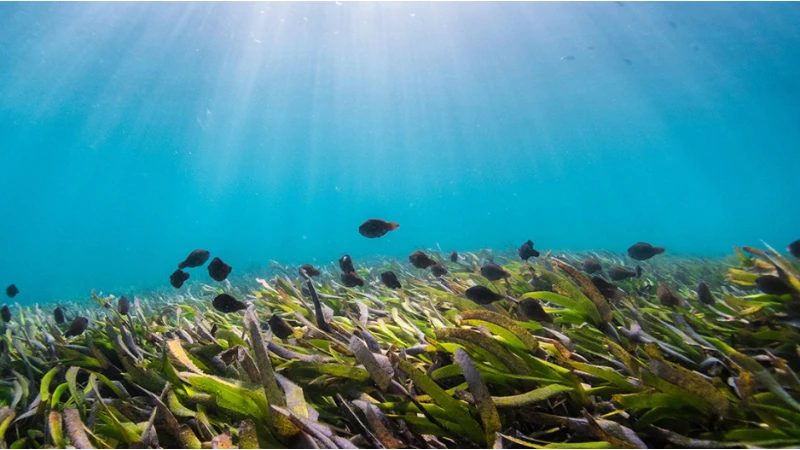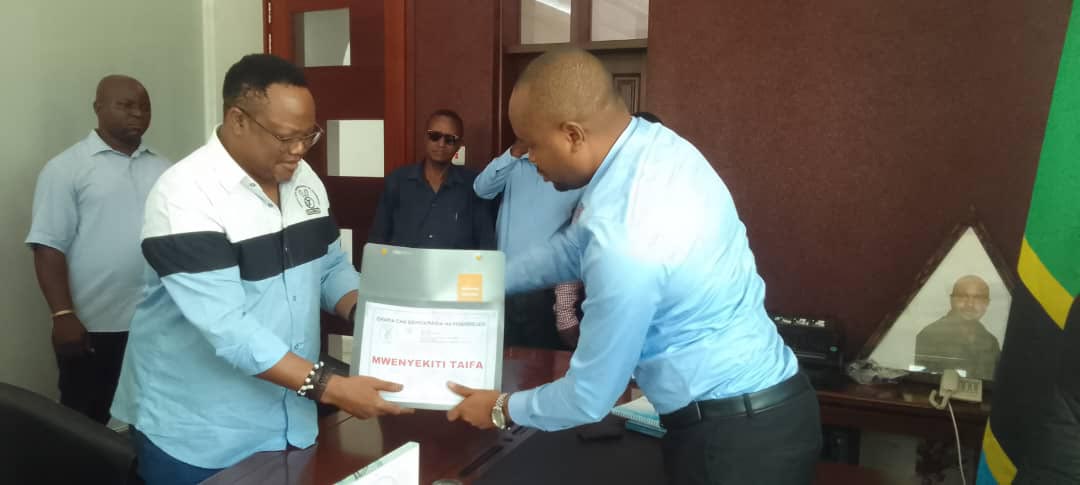The case for increased investment in ICT to aid sustainable blue economy

BLUE economy concept has been endorsed by the United Nations to promote sustainable use of ocean resources for economic growth, improved livelihoods and environmental conservation.
Tanzania’s rich coastline, including Zanzibar and Pemba islands, stretches along approximately 1, 424 kilometres of the Indian Ocean. Add this to lakes Victoria – the largest lake in Africa, Tanganyika – the world's longest and second deepest lake, Nyasa– the meromictic lake, Rukwa–the fluctuating lake, Natron–the red lake, Eyasi–the salt lake and Manyara–the flamingo lake. There are several rivers and dams too.
The aforementioned are not just water bodies; they are wealth waiting to be created and turned into cash money. The good thing about blue economy is that it creates employment opportunities for both skilled and unskilled people in entertainment and food apart from supporting other sectors such as transport and tourism.
But some Tanzanian academics think that there is one factor that can help the country realise its blue economy potential if it is given the importance it deserves: the information and communication technology.
Inspired by the zeal of President Samia Suluhu Hassan and Zanzibar President Hussein Ali Mwinyi, Abdi T. Abdalla, Kwame Ibwe and Baraka Maiseli (Department of Electronics and Telecommunications Engineering, University of Dar es Salaam), Daudi Muhamed ((Department of Technology & Innovation, WTC Zanzibar) and Mahmoud Alawi (Department of Telecommunication, Electronics and Computer Engineering (Karume Institute of Science and Technology, Zanzibar) undertook the study ‘Towards ICT-Driven Tanzania Blue
Economy: The Role of Higher Learning Institutions in Supporting the Agenda.’
The work investigated the contribution of ICT in sustaining Tanzania’s blue economy agenda. To this end, they extensively reviewed the curricula of selected Tanzanian Higher Learning Institutions (HLIs) to investigate ICT programmes in such institutions.
“Results showed that approximately 29 percent of the 24 selected universities lack ICT programmes and the remaining universities contain an inadequate number of ICT programmes,” reads study.
“This observation further suggests a need to reform the curricula for HLIs by incorporating more ICT programmes, especially those directly linked with blue economy. In addition, researchers should be encouraged and supported to undertake ICT multidisciplinary research focusing on maximizing the potential benefits of marine and fresh waters while preserving the environment.”
They noted that effective utilization of Information and Communication Technology (ICT) marks a key determinant for both individual business success and national economic growth. For the emergence of information age, in particular, emphasizes the importance of ICT in facilitating the nation’s socioeconomic development through education, research and innovation. The Tanzania National ICT Policy 2016 and the National Development Vision 2025 acknowledge that the nation can significantly accelerate its socioeconomic development and gain global competitiveness through development, utilization and exploitation of ICT.
For years, the Tanzanian government has been expanding access to social and economic services through transformation of ICT infrastructures. The government has constructed the National Fibre Optic Cable network and the National ICT Broadband Backbone to achieve its grand ICT vision. The backbone infrastructure enhances the usage of computer and mobile ICT applications, including e-government, e-learning, e-health, and e-commerce, and supports research, innovation and future ICT services. The government believes that ICT, if properly exploited, can positively influence productivity,
Role of ICT in Blue Economy
The academics argue that ICT can play a major role in sustaining the blue economy, if positively exploited to solve related challenges. With the advancement and proliferation of digital technologies, researchers and practitioners may exploit the capabilities of ICT to accelerate the success of blue economy in Tanzania.
“ICT can automate the business processes of all sectors of blue economy to enhance efficiency and optimize productivity while simultaneously promoting ocean health and country’s economic growth.”
ICT in Fishing
They note that use of ICT can reinvigorate the fishing industry and ensure its sustainability and improved welfare of Tanzania fishers, hence advancing the overall country’s economy.
Considering Tanzania as an example, small-scale fishers rely on their fishing experiences to plan for the next fishing sites. This approach does not guarantee the availability of adequate fishes and may create frustrations among fishers to lose their limited resources.
To address the challenge, ICT-based fish finder gadgets can be applied to instantaneously and accurately locate fish-rich sites. Consequently, we can reduce unnecessary costs incurred during the manual fish finding approach where fishers can move to a number of locations searching for the best places.
“Using the state-of-the-art technologies such as Machine Learning (ML), highly accurate algorithms can be devised to locate the fish sites and their corresponding species by using previous fishing information. This low-cost approach can be achieved through a careful observation of the fishers to track their fishing records that may serve as a training dataset for the ML models,” reads the paper.
“There have been a number of reported cases of missing and deaths of small-scale fishers due to emergency reasons, including boat sinks. If such events could be communicated without delay, then lives of fishers could be saved, thereby improving the reliability in the small-scale fishing industry. With the current state of ICT, a mobile application can be developed to track all registered boats and report vital information of the boats and fishers to the control centre for timely assistance. Emergency cases, including overfishing and boat sink or fire tragedies due to technical challenges, can be seamlessly exchanged between communicating parties to allow provision of appropriate assistance.”
ICT in Aquaculture
The authors of the report state that ICT can provide cost-effective tools to automate the entire business process of aquaculture and improve its efficiency and productivity. ICT can, without human intervention, facilitate measuring, monitoring and controlling of water quality parameters (e.g., temperature, salinity, and pH) to ensure optimal fish growth and reduction of fish mortality rate. It has been widely reported in the literature that the quality of water and feeding behaviour can adversely affect the fish growth rate.
“This observation adds extra operational cost as the fish will need more time before attaining the market weight. Using ICT solutions, the user can, in real-time, monitor the pond status, such as water level, and respond appropriately to maintain the optimum operating conditions. Also, the system can establish semi-automated or automated feeding schedules taking into account the age of the fish. Besides, the system can timely report all critical issues that may jeopardize the fish growth. Such a sophisticated system can significantly reduce the manpower without compromising productivity, an advantage that may maximize profit. The system may, in addition, create employment in the aquaculture industry and benefit both fishers and the country.”
Digital Fish Market
Traditionally, fish introduced into the markets, geographical physical sites, necessitate travel of customer to the selling points without the knowledge of the market status.
Physical markets are challenged by a number of factors, including inaccessibility during unfavourable conditions and insufficient information on the product availability, leading to wastage of time and resources. Such markets provide no direct link between sellers and potential customers. To alleviate these challenges, mobile fish markets have been widely applied whereby sellers use vehicles to reach potential customers. These movable shops, unaffordable to many local fishers, unnecessarily add extra cost attributable to human resources as well as fuel and maintenance costs of the vehicles.
They argue that ICT may provide advanced tools for the development of an online interactive market that considers the existing business processes, such as auctions, to complement the physical market.
“In the online interactive market, the buyer will not be obliged to travel but yet can view all the available market products and swiftly buy the selected products. Also, with the online system, the seller can generate timely reports for their business analysis.
Through this system, buyers can confirm transactions online and a reliable courier will be notified for delivery services, hence improving flexibility, adding convenience, and significantly reducing cost to the buyer. The system can create employment opportunities across various players in the Blue Economy ecosystem.”
ICT in Tourism
The academics state that evelopment of the tourism industry depends on the effective and high speed ICT infrastructure and software applications. The tourism management system requires tourists’ data to be accessed at different levels. The tourism attraction sites and other products should be readily available through the use of technology-based dissemination mechanisms, including dedicated broadcasting channels and social networks, to ensure that the intended information reaches a wider community. Customers should have the ability to share information and ratings on destination, quality of services for hotels and restaurants, and environmental and social conditions.
“The current challenges in the tourism industry include undertrained tour guides, which then lowers the tourists’ security and safety, a consequence that may reduce the number of potential tourists. To overcome such a challenge, mobile applications can be developed to automate the processes by providing auto-guides and translations (multilingual customized geo-maps).”
State of the Blue Economy in Tanzania
The scholars note that there have been commendable efforts by the Tanzanian government to establish the blue economy in country. The National Five-Year Development Plan 2021/2022– 2025/2026 (FYDP III) has established several strategies to ensure positive transformation of the fisheries industries, including utilization of the Blue Economy potentials for marine and fresh waters. The FYDP III has recommended effective methods to achieve a sustainable Blue Economy, hence promoting freshwater and deep-sea fishing, marine and freshwater conservation, and aquaculture. For instance, the government has been argued to facilitate fishing activities through procurement of fishing vessels and construction of fishing harbours.
“In different occasions, the current presidents Samia and Mwinyi have strongly supported the Blue Economy as a feasible approach to address most socieconomic problems. In Zanzibar, the initiative to establish the Blue Economy Policy2 started since October 2020 to ensure sustainable utilization of marine resources. Similar efforts are expected to be duplicated in the Tanzania mainland. Generally, these efforts provide a promising future for Tanzania to accomplish the goal of the FYDP III: “realizing competitiveness and industrialization through human development.”
Tanzania and France are members of the Indian Ocean Rim Association (IORA)3—adynamic inter-governmental organization with two primary objectives: strengthening of regional cooperation; and sustainable development within the Indian Ocean. As IORA members, the two will interact more closely in activities related to Blue Economy: tourism; safety and security; trade and investment; academic, scientific and technological exchanges; fisheries management; disaster risk management; and women’s economic empowerment. These encouraging efforts by the government provide a promising future for Tanzania to achieve sustainable socio-economic development through blue economy.”
Recommendations
The authors state that introduction of ICT in the Blue Economy sector cannot produce the intended benefits if unaccompanied by complementary organizational changes. A significant reform on the existing management structures should be made to create a conducive platform to practically realize the concept of Blue Economy. The government should establish a one-stop data centre in which data infrastructures, including data servers and associated systems, will be maintained.
‘Furthermore, adequate ICT human resource (experienced developers and technicians) should be prepared to undertake technical tasks in the centre. In this regard, the education system and curricula should, therefore, be adjusted accordingly to support the proposed concept.”
Curricula Adjustment
Sustainability of blue economy needs preparation of skilled personnel to support ICT related matters required to foster the technology. ICT experts and professionals majoring in Blue Economy should be trained well, preferably through local universities and research centres. The Commonwealth of Learning5 has shown the importance of establishing courses on Blue Economy to promote socio-economic development. Universities and the national research centres should establish new academic and professional programmes at all levels to foster the implementation of the concept of curricula review. Local universities should review their curricula, especially on the existing blue economy related programs, such as fisheries and aquaculture, marine sciences, fish markets, and tourism, to ensure the candidates acquire relevant ICT skills so that the graduates can digitize their respective business processes. Emerging technologies, including artificial intelligence, big data analytics, and internet of things should be considered as potential fields that experts should be equipped.
Top Headlines
© 2024 IPPMEDIA.COM. ALL RIGHTS RESERVED

























